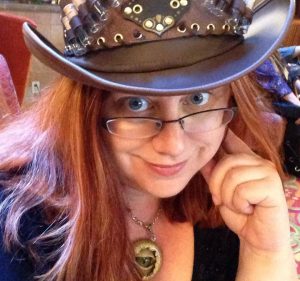2016 in Review
As I sit here in bed writing this post, it is just a few minutes after midnight on December 31st, 2016. Less than 24 hours remain before this year comes to an end.
In many ways, and for many people, this will be a year that we’ll be glad to see the back of. 2016 brought so much upheaval, so much darkness and tragedy, that watching it finally end feels like a mercy. From humanitarian disasters to political nightmares, from the Pulse shootings to the Ghost Ship fire to the nearly unimaginable string of celebrity deaths, this is a year that has tested our faith, our hope, and our institutions. Often, it feels like we failed those tests.
But when I look at this year on the personal level – when I think about what it has meant for me, for my career, for my future and my present – a more complicated picture emerges. Those disasters and tragedies are still there, lurking at the edge of my consciousness. They will doubtless always color the way I think about this year, when I look back on it. But this has also been an amazing, eventful year for me and Liminal Corvid Press, and I want to share my reflections on it with all of you.
For me, 2016 didn’t really begin until Monday, January 4th. That was my first day back at work after a ten day vacation, when my partner Mel and I went to spend the holidays with my family.
That was also the day my boss called me into her office and told me I was being laid off, effective immediately.
When you start the year by losing your job, it tends to put a lot of other things in perspective. In some ways, there’s nowhere to go but up.
I was unemployed for ten weeks. Nothing like that had ever happened to me before. I had been out of work for almost three months after finishing grad school, but back then I’d been living with my parents, so I had the time and space to hunt for a new job. This was the first time I’d been laid off, the first time I had to file for unemployment, the first time I had pets and a partner who were counting on me to make ends meet.
In the weeks that followed, I got a taste of what poverty feels like in rural America. We got our groceries from the food bank. We ate almost every night at our community soup kitchen, Loaves and Fishes, which was run in cooperation by a bunch of churches in the Livingston area. We had appointments with social workers and filled out piles of forms: to get medical care, to apply for food stamps, to apply for jobs, to request a modified payment plan for our car loans. We made tough choices about which bills to pay with the pittance I got from unemployment insurance. Our parents donated money to help with our car insurance. Friends sent us care packages and bought food for our pets.
But that brings me to the other thing I saw in this time: the amazing generosity of our friends and loved ones, and the incredible support of my fans. I had just launched my Patreon campaign a month or two prior to the layoff, and when I told the listeners of my podcast what had happened, they answered the call more resoundingly than I could have dreamed. Dozens of people made monthly pledges to support us. Two amazing fans even donated a hundred dollars a month, an absolutely staggering gift. I knew people couldn’t keep up this level of support forever, but they didn’t need to. All they had to do was help us keep our heads above water while I figured out what I was going to do next. By the time people reduced their pledges to saner, more typical monthly levels, Mel and I were established in our new life.
Moving to Wisconsin had never been something I had envisioned doing. It had all of the frigid cold winters that we got in Montana, with the added bonus of humid, muggy summers. To make matters worse, especially for my partner Mel, there were no mountains. After living so close to the wonders of central California, and then to the grandeur of Yellowstone and the northern Rockies, the idea of moving back to the Midwest felt like a letdown.
But Wisconsin had something that neither California nor Montana could offer: good-paying jobs in the sciences that could keep pace with the cost of living. And, as an added bonus, it was within a day’s drive of my family in Michigan. Since my parents are now in their sixties, and my nephew and nieces are growing up fast, I felt it was very important that our next move bring us closer to home.
So I applied for my current job, working as a microbiologist at a contract research facility in Madison. (Huge thanks here go to our friend Carolyn, who recommended me to the company’s recruiter and thus got me the interview that landed me the job.) This was an amazing opportunity on so many levels: the company paid for me to fly out for the interview, provided a generous signing bonus to cover relocation expenses, and has an excellent benefits package. Most importantly, it was an opportunity for not just a job, but a career: at this company, I can grow and advance while continuing to do hands-on science, instead of being forced to shift over to management (which is decidedly not my strong suit).
It’s hard to overstate what an amazing experience this has been for me. The only other job I’ve had that could be considered a career was my time as a science teacher, and that’s not really a career path so much as a career cul-de-sac. There were things that I loved about teaching, and there are many memories from that time that I cherish – but in many ways, I was not cut out for a career in teaching. After six years in the classroom, I had come to realize there were things about it that would always demoralize me, things that made me feel devalued and less than human, and – this is key – critical skills that I wasn’t improving on. I wasn’t the worst teacher ever, but I certainly wasn’t a good one. Not in all of the ways I needed to be, for myself and for my students. And I don’t know about you, but I couldn’t handle the idea of spending the rest of my life in a job that I wasn’t very good at.
In my new career, as a scientist doing contract research, there were things I wasn’t very good at when I started. There were ways in which the learning curve was bumpy, and I made mistakes that still embarrass me when I think about them. But the important thing is that I got better. By mid-year, I was showing significant improvement in the areas where I had struggled; by year’s end, my bosses were very satisfied with where I was and how far I had come. I’m doing good work now, and I’m poised to spend 2017 learning new things that will expand my skill set and move me down the path toward career advancement.
So now, for the first time in my life, I’m on a career track where I’m getting better, moving forward, and both I and my employers are happy with the work I’m doing. That’s an amazing feeling, and it’s one of the best things that happened to me in 2016.
This year has also been a major growth year for Liminal Corvid Press. In 2015, when I started podcasting and writing regularly again, I wrote 173,307 words. That was, by far, my best output ever in a single year. This year I pushed things even further, writing 220,548 words. I wrote on 273 days this year, compared to 220 in 2015. I spent over 300 hours writing, and while that’s nowhere near being a full time job, it’s pretty darned good for somebody who’s working a full-time job on top of being a writer.
I worked on seven different story projects in 2016. Three of these I completed: “Drabbles of the Gods,” “Rafak Aliri and the Ghostly Bride,” and “A Wizard Family Solstice.” I also wrote 7700 words on “The Blood God’s Gift,” which is looking like it will be a short novel; 5300 words on “The Nearness of You”, a short story that is probably about 75% done; and 3600 words on “The Facts in the Matter of Gordon Chadwick,” which was my attempt at writing a Cthulhu Mythos/Ministry of Peculiar Occurrences crossover story, and which probably isn’t going to end up being finished, at least not any time soon. But far and away, the bulk of my writing this year was on The Lost and the Least: I added more than 95,300 words to the manuscript in 2016, bringing it up to 140,300 words and counting. The book is now tantalizingly close to being finished, and I truly believe I can wrap up the first draft in January.
I also spent a LOT of time this year working on scripts for the podcast. Of the words I wrote this year, about 67,000, or roughly 30% of them, were for podcast scripts. I have to admit, I was shocked the number was that high. Now, sometimes it’s nice to take a break from writing fiction to work on the podcast, and it can be a good way to keep my chain going when my brain is fried and the words aren’t coming to me. All the same, I’d like to spend a greater percentage of my writing time next year on words I can actually sell.
On the business side, this was a good year for Liminal Corvid Press. Because of the Patreon campaign, this was the first year that my writing yielded a significant percentage of my income. I now have more than a hundred patrons making monthly pledges. That means that I’ve been able to afford business moves like upgrading to a paid file hosting service, which has hugely improved the reliability of podcast delivery, and cloud-based backup storage, which provides insurance for my fiction and my recorded audio. For next year I’m going to sign up for Quicken’s small business service, which will help me keep better track of my income and expenditures and make it easier for me to handle my taxes. And, of course, I’ve been able to commission artwork for my stories from Randall Fulton and Ben Clifford, which will eventually find its way to illustrated editions of the story collections.
I released both Making the Cut and Divine Intervention in print this year, and I completed the podcast audio production of Things Unseen. Once I wrap up production on “Divide by Zero” in January, I will have all the pieces in place to produce commercial audiobook versions for Things Unseen and Divine Intervention.
Finally, though it was a small part of my overall business strategy for this year, I was immensely pleased with the success of my books at Balticon 50. I chipped in on a table in the dealer’s room with several other creatives in the podcast community, and by the end of the con I had sold through the entire stock I brought with me. This was just one of several things that made Balticon 50 a highlight of the year for me: others included the return of Metamor City Live, the success of Podcaster House, and joyful memories made with friends both new and old. I can’t wait to go back, and I look forward to having a new novel ready to bring with me.
I have several goals for 2017, both for my writing and for Liminal Corvid Press. Getting The Lost and the Least out the door in time for Balticon is my top priority, and this time around I will probably focus on producing the paperback version before I turn my attention to the e-book. That’s a reversal from the way I have done things in the past, and I hope it will help to make sure that the print and e-book versions come out closer together than they have done in the past.
After that, my next goal is to get into the catalog at Audible. I have a lot of stories out in e-book that could easily be paired with audiobook versions, and from what I’ve heard, that can be a major source of synergy for driving sales. The audio for Things Unseen is all in the can, and Divine Intervention will be ready to go soon. Getting Urban Legends onto Audible will be more time-consuming, because it will involve re-recording those old stories that are no longer up to my production standards. Still, I think it will be worthwhile, because I can also sell those stories as stand-alone short audio pieces. Anything you can package up and sell twice is usually a good business bet.
Once The Lost and the Least is done, I want to spend the rest of 2017 focusing on shorter fiction. I have several stories that I started in 2016, 2015, or even earlier that I can go back and finish, and I have several more ideas that have been waiting for me to have time to tackle them. I think I could easily put together two new story collections in 2017: one for Metamor City and one for my fiction in other settings. The Lost and the Least isn’t the end of Kathryn Kitaen’s story arc, but it does represent a “pause point” in the series, where I can go focus on other characters for a while without it feeling like I’m leaving my fans hanging. I also feel like it’s good for my writing to stay in practice at writing short fiction, to keep experimenting and trying new things, and not let one series of giant novels consume all of my attention as a writer.
There is, of course, no way for us to know what 2017 holds, for me or Liminal Corvid Press or anyone else. Looking back at this time a year ago, I certainly never expected all of the upsets and upheavals that took place in 2016. I can say, however, with confidence and gratitude, that I am ending this year in a better place than I started it, both personally and professionally. 2017 is sure to hold challenges; people I love and values I cherish are coming under attack, and those attacks are likely to only intensify. But where 2016 was a year of uprooting and starting over, I am beginning 2017 in a position of stability and groundedness. The coming year seems likely to be a time when I can pay forward the generosity and support that others extended to me in my hour of need, a time when I can help others instead of being the one needing help.
To everyone who has supported me, and continues to support me now, thank you so, so much. Mel and I could never have gotten through 2016 without you. As the new year dawns, let’s all carry forward that same spirit of openness and generosity to the people around us. It’s a big, scary world out there, and the problems facing us are great – bigger, in some ways, than I had ever suspected before this year. But I still believe that goodness and mercy and compassion will triumph over evil, hatred and selfishness, if we stick together and do not lose heart.
Happy new year, everyone. Here’s to a bigger, brighter, and more beautiful future – no matter how long it takes us to get there.



 In this week’s interview I talk to award-winning fantasy author Philippa Ballantine about her new novel, IMMORTAL PROGENY.
In this week’s interview I talk to award-winning fantasy author Philippa Ballantine about her new novel, IMMORTAL PROGENY. 
 I sat down in the virtual studio with NYT Bestselling Author
I sat down in the virtual studio with NYT Bestselling Author 

